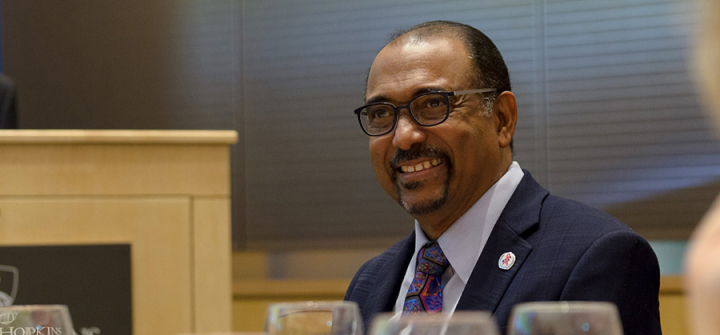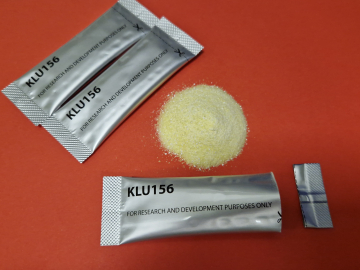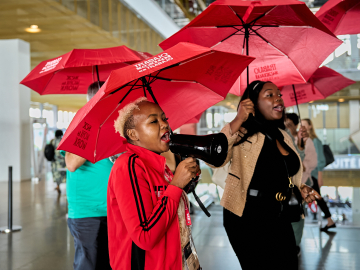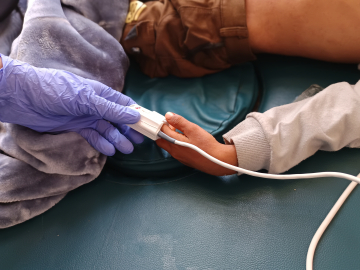HIV/AIDS: From Despair to Hope, A Q&A with Michel Sidibé, UNAIDS Executive Director, Part II
The future of UNAIDS is being a “global health advocacy and accountability organization” that integrates HIV work with reproductive health and other important health issues, says UNAIDS executive director Michel Sidibé in this second part of his interview with Global Health NOW. Achieving this will help the organization transform itself and reduce the fragmentation that’s too common in global health, he says.
Sidibé, who has led UNAIDS since 2009, also discusses the role of development in improving health, advice for global health students, and working with WHO Director-General Tedros Adhanom Ghebreyesus. He also explains why he avoids expensive hotels.
Read part I of the interview here.
What are your plans for the future of UNAIDS, where do you want to take it from here?
When I came, I said let us take AIDS out of isolation. I think it's time to take UNAIDS out of isolation ... and talk about more integration. HIV and TB, we know, but HIV and cervical cancer, HIV and reproductive health, HIV and cities—we can try so many other things today and transform this organization, so it becomes … a global health advocacy and accountability organization, which can bring even UNAIDS [to] a different level. I talk about, I worked a paper on that, that global health need is too fragmented. It's obsolete, the way it is today.
We need a strong normative organization. [This] means WHO, but reinventing WHO, making sure it's not just [re]structuring by putting one box [in]to other boxes, but making sure we have a vision on global health [that matches up] with 2017. The world is globalized—so [is the] movement of populations.
We need [to] really talk about and push government to start thinking about … health [and] what they should do themselves. Today ministers of Finance consider that health is a cost. They don't see it as an investment so most of the resources are coming from abroad.
How closely do you work with [WHO Director-General Tedros Adhanom Ghebreyesus] and do you see this as a new era with Africans leading these major—
I've known Tedros for so long, and I will completely work in harmony with Tedros but what will be the most important is to not forget that we are not just Africans, that we're global leaders. And being global leaders, we need to influence the world on which direction is the best for Africa and for the rest. I think we can really work very closely to make that happen. He's someone committed, he's someone with full understanding of local reality. I think he will certainly transform WHO, which is needed, which is more than needed.
Right. Do you see that being Africans, that you have a special credibility with leaders of developing countries?
I think I would have said that a few years back, but today I think leaders are looking for who is effective. I am seeing more and more young leaders at ministerial level … who are looking for a proper transformation of their countries. In reality, Africans are looking for efficiency, they are looking for the result, they are looking for people who can bring them transformation, which can help them to be better.
You've talked before, in interviews, about the importance of development and bringing up economies to help the health sector. Last month, you lauded China's Belt and Road initiative. Do you have concerns about the Belt and Road initiative, given the history of long-haul trucking in Africa and HIV? Are there downsides to that kind of development?
No, I don't think that. Because I think Belt and Road Initiative is about, from my point of view, 2 or 3 things. One is innovation, is how to make innovation available to everyone, everywhere. That is certainly very important to think about but is about, also, making society more inclusive, in terms of integration, economic integration, connectivity. Those are issues we will have to deal with. And I personally feel that if it is well managed, it can really open doors for more cross-border type of connectivity, which is critical for development today. We cannot afford to think that we will develop in isolation.
What would be your advice to students who are interested in global health, but have also seen many leaders come out through medical schools and have MDs, and you are somebody who doesn't. What would your advice be to them?
You know, I personally feel that it's not from where you come. You can come from an MD, or economics or other, [but] what is the most important is to be clear on your mission. The mission of someone coming and working in global health should be totally driven by social justice, should be really about redistribution of opportunity, making sure that any gain based on innovation, based on creativity of someone, should be made available to people who are left. And for me, that should be the driving force. Making sure that you reduce the gap between people in terms of health access.
It's impossible today to talk about stability, to talk about peace without talking about how you deal with the health of the people. You will not have a healthy planet without healthy people. It's impossible.
So, I noticed in your schedule, you're staying at the Holiday Inn Express [in Baltimore]. You don’t like the Four Seasons?
No, for me, it doesn't matter where I'm staying. Only things which is important is if I can [work out at a] gym and if I can really connect with people. I'm here not for holiday. I'm not here for Four Seasons. Honestly, I am here for meeting those people who are leaders on their way in public health and that's, for me, most important. Honestly, I don't care so much where I am staying.
No fancy hotels?
No. That is not—No, I am the opposite of that. I'm the opposite of that.
Join the thousands of subscribers who rely on Global Health NOW summaries and exclusive articles for the latest public health news. Sign up for our free weekday enewsletter, and please share the link with friends and colleagues:http://www.globalhealthnow.org/subscribe.html
UNAIDS Executive Director Michel Sidibé at the Johns Hopkins Bloomberg School of Public Health Alumni Day, September 15, 2017. Image by Mitro Hood.





